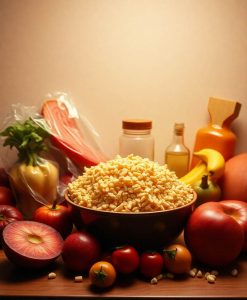Feeling the softness of a ripe apple or the grainy crunch of whole oats in the morning can be more than just sensory pleasure—these simple experiences are connected to your health in ways you might not fully realize. When we focus on what we eat, especially the quality of carbohydrates, we’re tuning into a quiet but powerful influence on our aging journey. It’s not just about avoiding sugar crashes or watching calories; it’s about understanding how the fuel we give our bodies in midlife can set the stage for a vibrant, healthy later life.
Many of us have grown accustomed to quick fixes—refined grains, starchy vegetables that seem like comfort foods, or processed snacks that fill us but lack nutritional depth. Yet, emerging research suggests that the quality of carbohydrates we consume during midlife might be a key factor in whether we age gracefully. Think of your body as a finely tuned machine: the kind of fuel you put in now can either keep it running smoothly or cause it to wear down prematurely.
Choosing the right carbs for healthy aging: what to know
What exactly makes some carbohydrates ‘high-quality’? It’s mainly the presence of dietary fiber and complex structures that digest slowly, providing steady energy without spikes and crashes. Whole grains, legumes, and fibrous vegetables are rich in these nutrients, supporting not only digestion but also blood sugar regulation and metabolic health. On the flip side, diets rich in refined carbohydrates—like white bread, pastries, and sugary snacks—are linked to a lower likelihood of maintaining health as we age.
Research focused on older women reveals that higher intake of dietary fiber and high-quality carbs in midlife correlates with an increased chance of healthy aging. This includes better physical function, cognitive health, and overall well-being. Conversely, consuming more refined carbs and starchy vegetables, which often lack fiber and nutrients, is associated with a decline in these positive outcomes. It’s as if we’re setting the foundation now for how resilient and energetic we’ll feel decades later.
Living with this awareness can shift your daily choices. Incorporating more whole grains—like oats, quinoa, or brown rice—alongside a variety of colorful vegetables provides your body with the steady energy and nutrients it needs for optimal function. It’s about making mindful swaps: replacing a white bread sandwich with whole-grain bread or choosing baked sweet potatoes over fried starchy sides. These small changes reinforce your body’s capacity for renewal and strength well into old age.
How your midlife eating habits influence your future health

The connection between diet and healthy aging isn’t just about avoiding illness; it’s about actively nurturing your body’s potential for vitality. When you prioritize high-quality carbohydrates rich in fiber, you support your gut health, stabilize blood sugar levels, and help maintain muscle and brain function. These are the subtle, but profound, ways your daily food choices shape your future self.
It’s easy to overlook the importance of carbohydrate quality amid the busy rhythm of life. Yet, understanding that the carbs on your plate today can influence your independence, energy, and mental clarity tomorrow empowers you to make more conscious decisions. Choosing fiber-rich options isn’t a restriction; it’s an investment in your future happiness and independence, allowing you to greet aging with strength and grace.
So, as you reflect on your current eating patterns, consider how the quality of your carbs might be supporting or hindering your journey toward healthy aging. Small, consistent shifts—favoring whole grains and fibrous vegetables—can make a substantial difference, helping you enjoy your later years with the same zest and vitality you feel today.
Learn More: In healthy aging, carb quality counts
Abstract: Intakes of dietary fiber and high-quality carbohydrates in midlife are linked to increased likelihood of healthy aging and other positive health outcomes in older women. Higher intakes of refined carbohydrates and starchy vegetables were associated with lower odds of healthy aging.
Link: Read Full Article (External Site)


